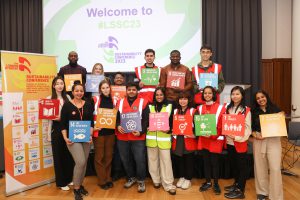This guest blog post was written by Elisabeth Möhlenkamp, first-year English Law and German Law student at King’s College London and volunteer at LSSC23.
This year’s annual London Student Sustainability Conference (LSSC) was a collaboration between ten of London’s universities, offering a space for student-led talks, workshops, conversations, and presentations centered around the UN Sustainable Development Goals. As one of many volunteers helping ensure the day ran smoothly, I was intrigued to see how the conference would effectuate convergence between the differing ideas and perspectives on sustainability.
I am a first-year English Law and German Law student at King’s College London, and up until my final year, where I can choose to specialize in a particular area of law, I do not think my course will cover climate justice and the law in any great depth (although I will have to see). z. However, I have a profound personal interest in climate justice (which was one of my main motivations to apply to law school in the first place). As a result, I aim to take advantage of as many opportunities as possible to engage with people who work in sustainability, who can teach me about new developments, who can demonstrate how sustainability is incorporated into various fields of study, research, and jobs. I volunteered at the LSSC conference to meet coordinators and students who shared my interest in climate justice and sustainability more broadly. I wanted to listen to the talks and projects that were presented, and also knew that it would be valuable to participate in a conference where everyone, despite their area of study, had an interest in how we can make the UN Sustainable Development Goals a reality.
I left the conference with a few general observations: Firstly, the featured projects were tailored to speak to people with varying degrees of knowledge. Some projects required basic prior knowledge in the respective field to fully understand the studies: One student presented innovative chemical manufacturing processes of an alternative material to plastic. Someone else had creatively designed a card game to indicate a food’s wastefulness, climate-friendliness, and seasonality to consumers. Thereby, sustainability was presented as a broadly applicable topic, from everyday life to specialized scientific research.
Secondly, the conference undoubtedly mirrored that Sustainability hits a nerve with each and every attendee, and it stimulates dedication and interest in an unparalleled fashion.
The closing event, which reunited attendees for a networking session, clarified that sustainability is near to people’s hearts: rarely have I observed and engaged in this many animated conversations, nor have I experienced proactivity and willingness to collaborate to this extent.
At the end, I noted that my perception of sustainability had changed. I find that in a university environment, sustainability as an idea is often closely connected to a certain career path rather than an end in itself: In an academic environment, sustainability is often mentioned in relation to ESG or Sustainable Finance. Surely, this phenomenon indicates increased awareness to the topic, but it causes loss of sight of all the issues that sustainability truly encompasses. Food Insecurity, socioeconomic status, physical and mental health issues, and the intersection of sustainability and humanitarian needs were discussed in the conference. The diversified content reinforced the need for interdisciplinary exchange to maintain an overall perspective.
I am sure speakers left the conference feeling buoyed by the unanimously positive feedback. Two students contently reported that attendees responded to their respective talks with inquisitive feedback and compliments on the exciting insights. Indeed, a successful event such as this acts as a propelling stimulation for those considering dedicating themselves to a sustainability-related project. To me, the conference meant newly acquired knowledge, exciting ideas, illuminating conversations, and several thrilling book recommendations, which all touch on sustainability, in all ways imaginable.
Elisabeth Möhlenkamp volunteered at LSSC on 20 February 2023. Whilst the conference has now taken place, you can still view the poster submissions for the event here. The conference will take place again in February 2024.


